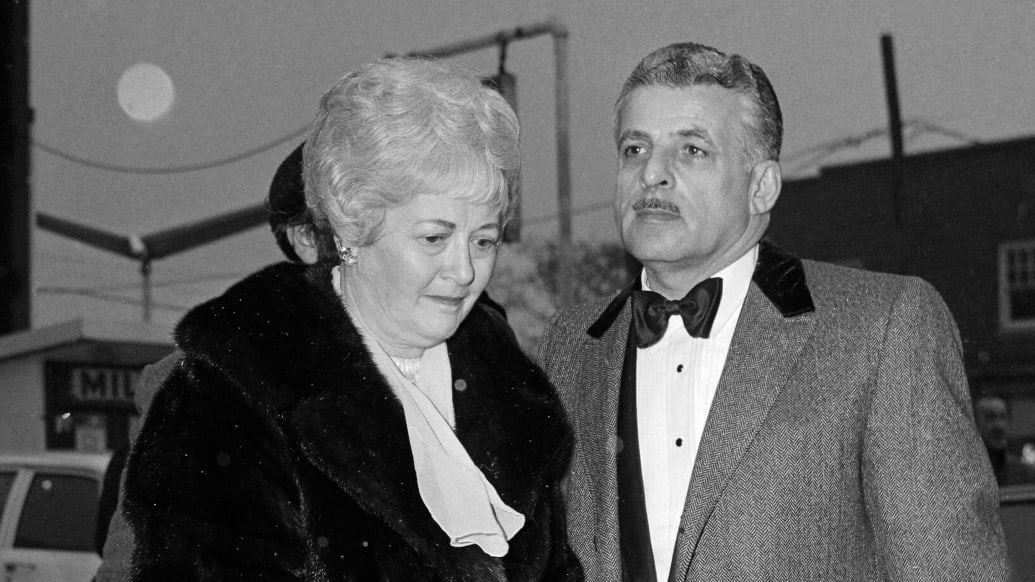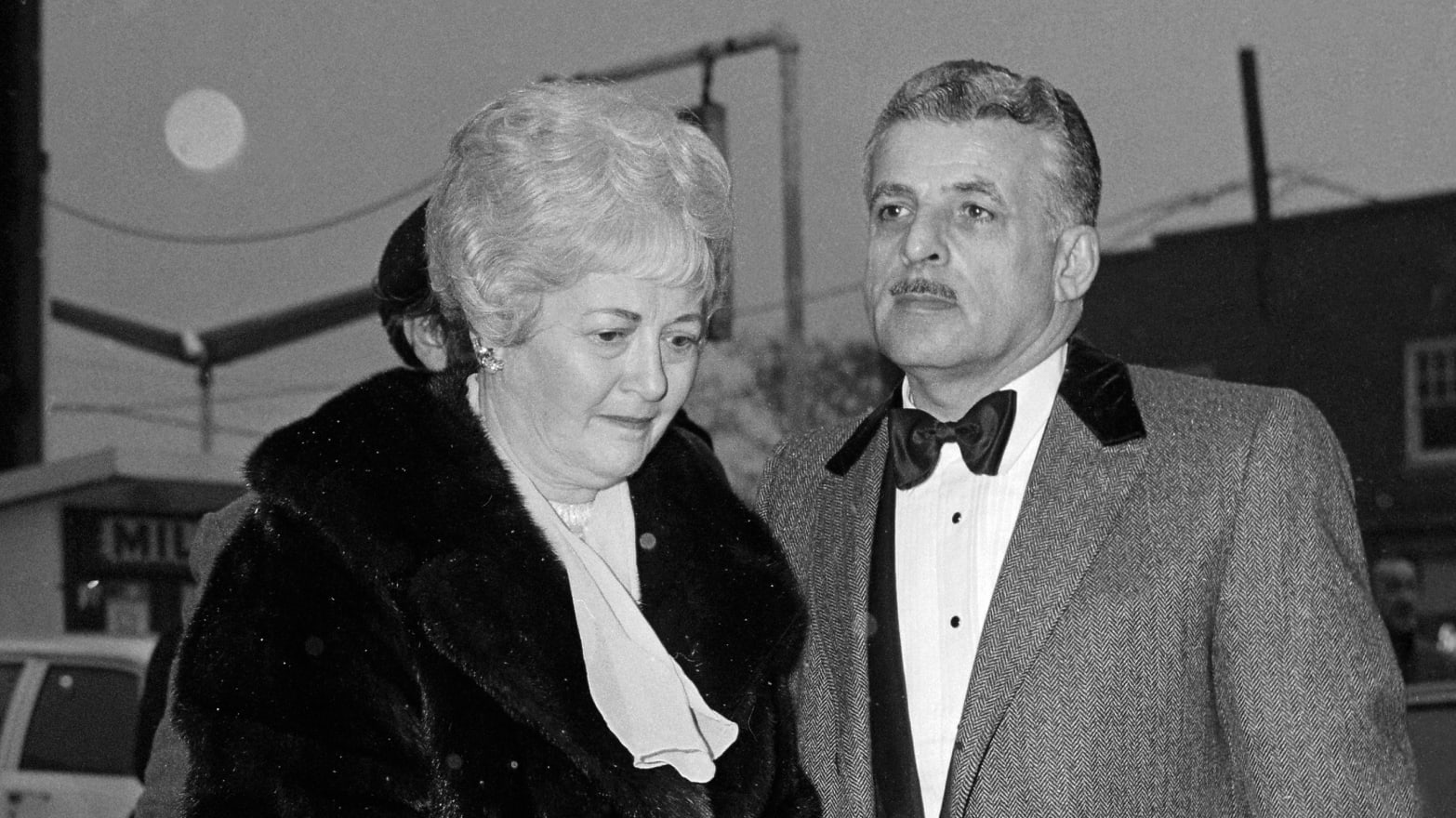The nightmares and panic attacks suffered by Tony Soprano as played by James Gandolfini seemed authentic enough to anybody who had listened to the FBI recordings of a real-life New Jersey mob boss in the 1960s.

Simone DeCavalcante was the boss of the crime family that bore his name and a FBI bug recorded his every word to his secretary when he arrived at his office one morning in 1964.
“I had a terrible dream… about a bunch of cops!” he exclaimed, adding that the secretary had featured in it. “You were screaming… You had pearls on… Everything was so screwed up… Mary [his wife] woke me up…something about pearls… I don’t remember.”
The bug also recorded the then-52-year-old DeCavalcante being robustly intimate with the secretary. Her husband called the office and DeCavalcante chatted with him while periodically muffling the phone and muttering encouraging endearments to her.
When the transcripts were unsealed in court, it became apparent that the affair with secretary was just one of many liaisons. The wife, Mary DeCavalcante, remained remarkable restrained when a reporter showed up at her home in Princeton Township. She opened the front door and spoke over the yapping of her schnauzer.
“If you don’t mind, I’d rather not talk about it,” she said. “I don’t mind your asking, but I hope you appreciate my feelings.”
Underboss Frank Majuri was recorded telling Simone DeCavalcante that he “shouldn’t run around because Catena and Gambino don’t.” Majuri meant Gerardo Catena of the Genovese family and Carlo Gambino of the family of that name. The Genovese and the Gambino families were and are among the five New York families, the Ivy League of the Mafia. They operate in the realm made mythic by The Godfather and their bosses are figures of legend. DeCavalcante would have loved to be considered their equal.
“They don’t recognize more than five families,” a law-enforcement expert notes. “That’s it.”
Never mind that DeCavalcante had transformed a bunch of ever-warring factions into an immensely profitable operation. He had recently doubled the number of made members and he was taking full advantage of his native state’s remarkable propensity for corruption at all levels of government.
DeCavalcante can be heard on the recordings expressing some bitterness when Joe Colombo of the Colombo crime family was appointed to the ruling Commission at Carlo Gambino’s urging. DeCavalcante had hoped that he himself might get the honor and make his a sixth family.
“[Colombo] sits like a baby next to Carl [Gambino] all the time,” DeCavalcante said. “He’ll do anything Carl wants him to do.”
DeCavalcante went on to say, “Sometimes, Frank, the more things you see, the more disillusioned you become. You know, honesty and honorability, those things.”
Majuri replied, “Yeah. If you’re a real honest guy, you wind up [a] hunchback with headaches.”
A feeling that he had not received his due respect may have added to DeCavalcante’s dislike for the nicknames “Sam the Plumber” (he owned a heating and plumbing company) and the “Claw” (he made sure to collect every usurious penny in loan sharking). He preferred “The Count.” (He told people his father had been an Italian marquis.)
Whatever the truth of his lineage, DeCavalcante did have a certain courtly touch when he settled disputes or helped a younger mafioso through a rough patch in his marriage. DeCavalcante always paid a good price when persuading judges and politicians and cops to sell their souls. He sounded like any worried father when he fretted aloud about his three sons.
But, he could turn instantly savage when his authority was challenged. He was recorded telling Majuri of going with fellow mobster Gaetano “Corky” Vastola to visit someone who had failed to come in for a chat when summoned.
“Ba-boom! Corky hit him,” DeCavalcante said. “I thought he was gonna fly though the wall. Then he hit him another one. He started hollering. ‘Help, Help.’ I told him, ‘Now do you understand what I mean when I say I want to see you?’ [He replied] ‘Yes, I’ll do anything you say.’”
DeCavalcante added to Majuri, “You know, I work one way, and that’s the right one. Saying a thing and doing it are two different things.”
He declared that This Thing of Ours and Our Friends were the same, whether it be among the five families of New York or his family in New Jersey.
“Cosa Nostra is Cosa Nostra,” he declared. “An Amico Nostro is an Amico Nostro.”
Being that he was recorded saying this, it did little to improve his stature on the other side of the Hudson. It also helped send him to prison. He retired to Florida upon his release.
The new boss was Giovanni “John the Eagle” Riggi. He landed in prison after seeking to curry favor with John Gotti by arranging the murder of a former newspaper editor turned toxic-waste dumper and potential informant. Riggi’s hope to put the DeCavalcante family “back on the map” with the killing was dashed when it became known that when stealing license plates to put on a getaway car, one of the hit squad had inadvertently chosen the plates of a vehicle belonging to the wife of a well-known mobster. The plate number was written down by a witness who saw the hitman tossing the guns in a stream.
“I’m sorry, I hope everybody doesn’t blame me,” an informant would quote the hapless hitman saying before he himself was hit.
Giacomo “Jake” Amari became the acting boss and thumbed his nose at the five families by recruiting new members in New York and operating a social club in Little Italy. He was then summoned to a sit-down where he agreed to withdraw. He soon after died of stomach cancer.
Riggi placed the family under the day-to-day direction of a ruling panel headed by Vastola, whose various activities ranged from shaking down dice games to promoting concerts by Ray Charles and Aretha Franklin. He also ran Roulette Records and golfed on occasion with Sammy Davis, Jr.
Vastola then landed in prison and John D’Amato became acting boss until the girlfriend he shared with another mobster revealed that he was bisexual. Riggi is said to have given the go-ahead from prison for a killer named Anthony Capo to dispatch D’Amato.
“Nobody’s going to respect us if we have a gay homosexual boss sitting down discussing La Cosa Nostra business,” Capo later testified.
The killing was one of a litany of murders and other crimes listed in a racketeering indictment made possible by an informant who had been assisting the FBI for a decade. More than 30 members and associates of the family were arrested. One of them decided to cooperate and a dozen more were grabbed. Riggi was hit with another 10 years just as he was about to be freed.
By 2005, nearly 50 people connected with the DeCavalcante family were behind bars. The vaunted five families were faring even worse, to the point of virtual extinction. And they were now finding themselves overshadowed by a TV show about a New Jersey crime family modeled after the DeCavalcante family.
In fact, the show’s remarkable success could be attributed in part to it not being in the realm of The Godfather and the five families. The opening sequence of the first episode in 1999 made clear that this was New Jersey. And Tony Soprano was not a Michael Corleone. He was a knockaround Jersey guy rising to power in the fictional DiMeo family, founded by Ercole DiMeo, who had been sent to prison just like Simone DeCavalcante. The DiMeo family had then been taken over by Jackie Aprile, who dies of cancer just like Jake Amari. The members include Vito Spatafore, who is killed after it becomes known he is gay, just as John D’Amato was killed.
By stepping outside myth, the show brought the expectation that it would be something new and authentic. And authentic it was, almost as if the FBI had just kept recording after DeCavalcante’s death in 1997 and on through Amari’s death and into the present day. The scene where the FBI breaks into Tony’s basement to plant a bug was so realistic that an agent who happened to encounter two of the show’s head writers at The Buffalo Club in Santa Monica asked where they got their information. The writers just looked at each other and said nothing.
Around the end of the first season, an actual FBI electronic device carried by an informant recorded members of the DeCavalcante family chatting about the show as they drove to a sit-down.
“Hey, what’s this f—-ing thing, Sopranos?” Joseph “Tin Ear” Sclafani asked. “Is this supposed to be us?”
The thugs had just been bemoaning the continued lack of respect they received from the five families. But that was forgotten as Anthony Rotondo rhapsodized about The Sopranos.
“What characters,” Rotondo said. “Great acting.”
As in The Sopranos, the DeCavalcante family recruited a new arrival from Sicily. Francisco “Frank” Guarraci hailed from Simone DeCavalcante’s ancestral hometown of Ribera. Guarraci is said by the FBI to have been inducted by Riggi in place of the hitman who screwed up with the license plates and otherwise would have been next to be made. Guarraci allegedly rose to acting boss as he continued to work as a foreman with a laborer’s union. He hung out at the Ribera Social Club in Elizabeth, remaining so low-key that even some members of the family were unaware of his alleged position. His other advantage over the more high-profile families in New York was that law enforcement in New Jersey is more fragmented and less zealous.
If Guarraci is indeed an acting boss, it seems he is the only one still out there being a gangster a la the fictional Tony Soprano, at however small a scale. The bosses of the five families on the other side of the Hudson River were busy hiding and pretending they were not in charge of anything when Guarraci strode right into Lenny’s Brick Oven Pizza in Washington Township, N.J. in August 2010 and announced that he was taking over the business.
“I run the show,” the ensuing indictment quotes Guarraci screaming when the general manager balked at turning over the receipts.
The indictment reports that Guarraci then fired the general manager.
“Which directive G.M. ignored and then continued working,” the indictment notes.
Guarraci and a man who would be arrested with him became more insistent and threatening.
“Two of the restaurant’s waitresses, young women in their late teens, began to cry,” the indictment says. “Several customers became alarmed and exited the restaurant, without paying their bills. At least one customer called 911 seeking police assistance.”
Guarraci pleaded guilty and in January 2012 got off with six months of home confinement, followed by five years’ probation. He is believed by law enforcement to remain the boss, even though Riggi was released in November 2012, after 22 years in prison. He is now 87.
Guarraci is 54. He is said by law enforcement to remain a boss who may outlast them all in the five families for the same reason that helped make The Sopranos such a hit.
Jersey is still Jersey.
But Guarraci and DeCavalcante and the others of that crime family are just criminals. The people in New Jersey who are really worth admiring are people such as the actual family that gave us the actor who summoned their example of hard, honest work as he so brilliantly played the fictional gangster Tony Soprano.
James Gandolfini’s parents came emigrated from Italy to New Jersey. His father, James, Sr., received a Purple Heart during World War II and worked as a mason and then as a high-school custodian. His mother, Santa, worked as a high school cafeteria chef. Their reward was to see their son enter Rutgers.
After college, the son discovered his calling. He became a boss of acting as he played an acting boss.

